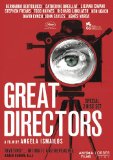| Reviews & Columns |
|
Reviews DVD TV on DVD Blu-ray 4K UHD International DVDs In Theaters Reviews by Studio Video Games Features Collector Series DVDs Easter Egg Database Interviews DVD Talk Radio Feature Articles Columns Anime Talk DVD Savant Horror DVDs The M.O.D. Squad Art House HD Talk Silent DVD
|
DVD Talk Forum |
|
|
| Resources |
|
DVD Price Search Customer Service #'s RCE Info Links |
|
Columns
|
|
|
Great Directors
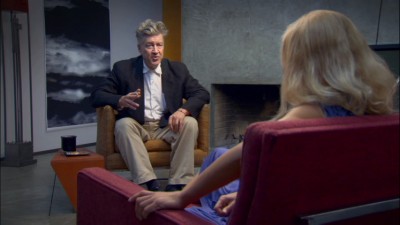
It's usually almost impossible for a film's content (the story in a fictional narrative, or, for a documentary, the subject) alone to carry it, without a lot of intervention on the part of the filmmaker, but that is pretty close to what happens in Angela Ismailos's Great Directors, a documentary comprised of conversations between auteurist-cinephilic interviewer Ismailos and various international directors she considers great, from Bernardo Bertolucci to Agnès Varda. At least some more effort was undoubtedly involved on Ismailos's part (even if that had more to do with gaining access to her subjects than anything else) than the not at all laborious flow of the film might suggest, but given that each director she interviews is of at least some innate appeal to anyone with even a passing interest in world cinema, it would appear that all she had to do was get her crew in, mic herself and the director being interviewed, just let them discuss their films and free-associate from there, and voila--the perfect treat for anyone enraptured with the medium and curious about the artists who work in it.
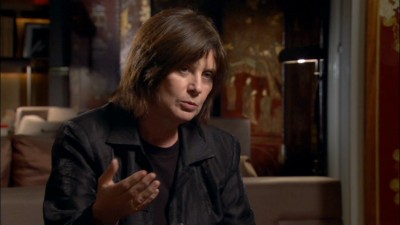
For the most part, that is just what Great Directors is. The filmmakers with whom Ismailos sits down for movie talk are, in alphabetical order: Bertolucci (The Conformist, The Last Emperor); Catherine Breillat (Fat Girl, The Sleeping Beauty); Liliana Caviani (The Night Porter); Stephen Frears (My Beautiful Laundrette, The Queen); Todd Haynes (Far from Heaven, I'm Not There); Richard Linklater (Slacker, Before Sunrise), Ken Loach (Kes, The Wind that Shakes the Barley); David Lynch (Blue Velvet, Mulholland Drive); John Sayles (Lone Star, Silver City) and Varda (Cléo from 5 to 7, Vagabond). Ismailos has organized the interviews into segments by topic rather than director, so the film alights on one director, then another, then the next as each discusses their origins and first forays into filmmaking during the first section, then back again as we return to each one for in-depth takes on their subsequent filmography--inspirations, production, reception, etc.--wrapping up on some contemplations of cinema's future, with plenty of digressions along the way for brief clips from the works mentioned and discussions of the auteurs' own "great directors" (Fellini for Lynch, Pasolini for Bertolucci, Bergman for Breillat, Fassbinder for Haynes). Ismailos has found uniformly pleasant (if sometimes a bit anonymous) settings in which to interview the filmmakers; the shots range from medium-wide to medium-close, at times with Ismailos in frame, at others with just the interviewee; and everything flows together quite well as a smooth, enlightening, and privileged conversation about the meaning and making of cinema with people who know more about, and have more to say on, the subject than virtually anyone.

As the film's interlocutor, Ismailos has the interpersonal skills and tact to make each of her subjects seem remarkably relaxed and glad to participate, so in addition to all the interesting thoughts and revelations they verbalize, we also get the thrill of taking in the distinct, sometimes eccentric personalities revealed not so much by what they say, but by how they say it. Bertolucci's mischievously avuncular quality, Linklater's gentle self-deprecation, Breillat's haughty pugnacity, Lynch's always-surprising wide-eyed boyishness, Varda's spry and charming grandmotherliness, Haynes's cool-laid-back-professor intellect--it's all palpable and elicited by Ismailos in a way that makes us feel she is letting us get to know the person, not just the artist, a little bit better.
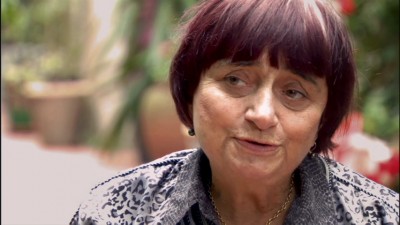
Now for the minor quibbles. Ismailos is a fine interviewer and most often wisely just lets the directors speak without interjection, but there are some terribly odd, unintentionally hilarious cut-in moments (they actually look and feel like something from an SNL sketch parodying a project like Great Directors) in which she, tooling around Hollywood in a sports car with her hair blowing in the wind or wandering pensively in slow motion through a Paris park, indulges in some astonishing, preening self-regard, placing herself front and center in a grandiose manner as if to remind us that she's a personality in the film, too. This makes for some comic relief, and it would be unfair to fault Ismailos too severely (she's just behaving like a fan, to the extent that all fandom and hero worship has that embarrassing aspect of emulation, projection, and general wannabe-ness to it), but these bits, fortunately brief and infrequent, stick out like puzzling, pointless sore thumbs. Another little puzzlement is the difficulty of pinning down what, exactly, Ismailos's criteria for "greatness" were, or in what ways these particular directors meet them. We are also left to wonder about the lack of symmetry--why Caviani and Frears, for example, get notably less screen time than some of the others. (Are they proportionally less "great" as filmmakers, or just more reticent interviewees?) None of that, however, even comes close to being enough of a distraction or flaw to make Great Directors anything less than an enticing and pleasurable all-around experience, one that is probably as close as most of us will ever get to just hanging out with these behind-the-camera luminaries of cinema for some friendly yet focused conversation about the attitudes, thoughts, and experiences that lie behind their variously intriguing, distinctive, and impressive bodies of work.
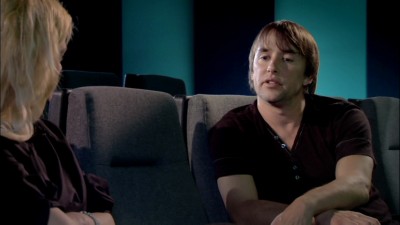
THE DVD:
Some of the clips from the directors' films used as illustration during the discussions could've used a bit more cleaning up, but the roughness is more forgivable in what we understand is basically being used as secondhand/supporting footage. The film's interviews, on the other hand, were shot with digital video cameras for an unobtrusive look that highlights the immediate presence of the directors and makes a seamless transition to DVD with this anamorphic-widescreen, 1.85:1 aspect-ratio transfer.
Sound:The Dolby Digital 2.0 surround soundtrack is more than up to the minor demands placed on it by the film's sound, most of which consists of conversation (with French and Italian audio and English subtitles as warranted for Caviani, Breillat, etc.) and Joel Douek's intermittently heard piano/orchestral score, all of which come through perfectly balanced and clear, lending an in-the-same-room intimacy to the film's spoken exchanges.
Extras:The extras are what really make the DVD version of Great Directors essential viewing. Several hours' worth of (sometimes very) extended versions of the film's interviews is definitely more of the same, but in this case, that's hardly too much; it's more like getting three scoops of ice cream in your sundae instead of just one. It would seem that the interviews got cut down more to meet the requirements of Ismailos's organization of the material and the running-time requirements of a feature than for any deficiencies in quality or relevance. After spending the time with these interviewees that the feature allows for, you likely will not be able to resist the opportunity for more afforded by this generous amount of bonus material.
FINAL THOUGHTS:What documentarian and cinephile Angela Ismailos aims for with Great Directors--a relaxed sit-and-chat with some world-renowned filmmakers, giving them an opportunity to discuss their lives, their work, and their feelings, opinions, and predications about cinema in general--sounds like a surefire delight as an idea and is, indeed, pulled off with very few hitches. The actual "greatness" of the directors Ismailos has chosen will, of course, vary depending on one's own tastes, aesthetic value judgments, and even politics. But the way the conversations in Great Directors just fly by as they edify and entertain leaves no room to doubt these filmmakers' greatness as thinkers and speakers when it comes to the medium that has touched and inspired them, and through which they in turn mean to touch and inspire us. Highly Recommended.
|
| Popular Reviews |
| Sponsored Links |
|
|
| Sponsored Links |
|
|
| Release List | Reviews | Shop | Newsletter | Forum | DVD Giveaways | Blu-Ray | Advertise |
|
Copyright 2024 DVDTalk.com All Rights Reserved. Legal Info, Privacy Policy, Terms of Use,
Manage Preferences,
Your Privacy Choices | |||||||









